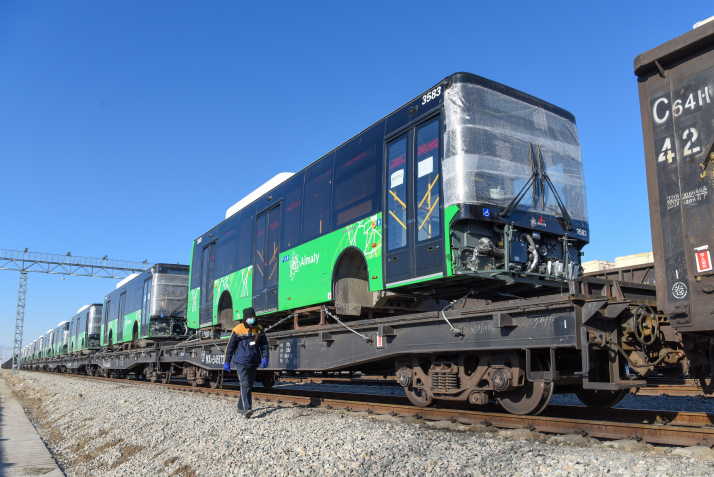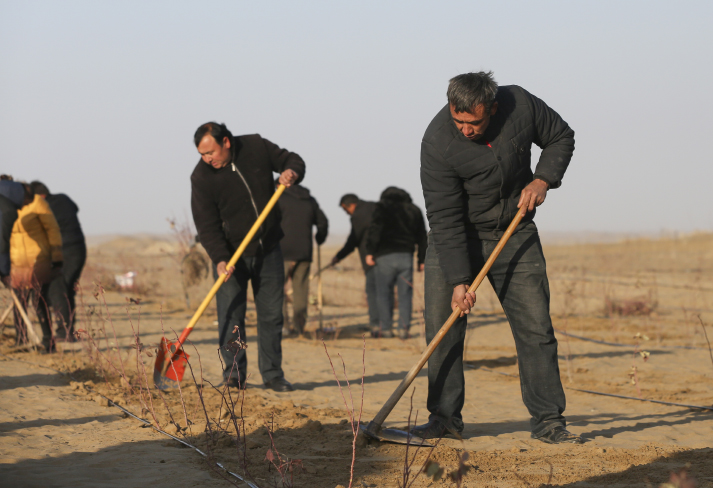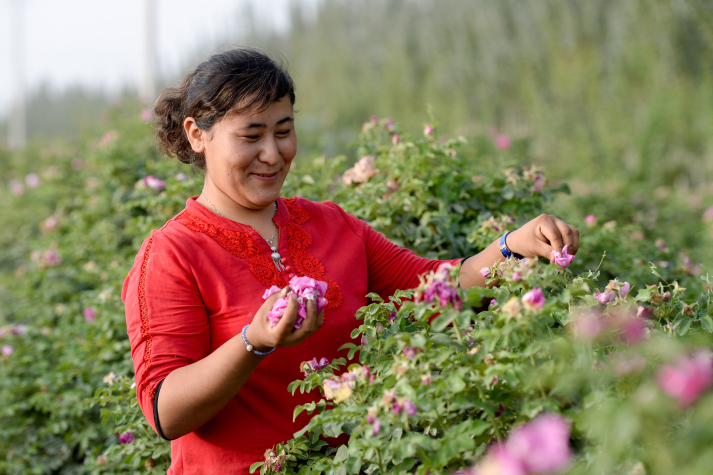| Xinjiang Today |
| Answer the call of duty | |
|
|
 A staff member inspects a China-Europe freight train carrying buses for export at the Huoerguosi Port in Xinjiang Uygur Autonomous Region on February 6, 2021 (XINHUA)
Before submitting his suggestions to the 14th National People's Congress (NPC), China's top legislature, in early March, Yumarjan Kurban meticulously refined his materials, filling them with annotations. As a representative from an energy enterprise in northwest China's Xinjiang Uygur Autonomous Region, he has consistently followed the region's energy industry development with keen attention.
Previously, Yumarjan conducted in-depth research on the development of the coal-to-gas industry, advocating for further national support. He emphasized that Xinjiang plays a crucial role in safeguarding national energy security. Accelerating the industry's growth, he noted, will not only enhance the efficient utilization of Xinjiang's high-quality coal resources, but also expedite the transformation of its resource advantages into industrial strengths. In the first half of 2024, Xinjiang's output of raw coal from leading enterprises reached 240 million tons, up 13.4 percent year on year. Based on its rich coal resources, Xinjiang is accelerating the establishment of coal-to-oil and gas, coal-to-olefin, and coal-based new material industry chains, with rapid development of industrial clusters, including coal and coal-fired power generation, as well as the coal chemical industry. On March 3, Yumarjan, together with another 58 Xinjiang deputies, arrived in Beijing to attend the Third Session of the 14th NPC, China's most important annual political event—which ran from March 5 to 11 this year. Together with lawmakers from other province-level regions, they discussed and deliberated several documents such as the government work report.  People plant rose saplings in a sand control demonstration area in Yutian County on November 28, 2024 (XINHUA)
Becoming a lawmaker "I went through several procedures to become an NPC deputy, starting from a grassroots electoral process. These include voter nominations, qualification reviews and competitive elections. Upon learning of my election, I felt immensely honored and deeply aware of the great responsibility I bear," Yumarjan told Xinjiang Today. The grassroots election, held once every five years, is the most basic level of China's electoral process, where people can directly vote for their preferred candidate. NPC deputies are elected from across China. They are the voices of the people they represent, with their suggestions usually relating to the regions they come from, the fields in which they work, and the topics at play in society. "As a deputy to the NPC, my daily work primarily revolves around fulfilling my duties in accordance with the law. I stay closely connected with the people through on-site inspections, field research and community visits in order to gain a deeper understanding of people's needs. Additionally, I participate in legislative research and policy discussions, contributing ideas and suggestions to promote national development," he added. As NPC deputies, they strive to transform each suggestion into tangible development outcomes and, ultimately, improve people's wellbeing. Suggestions concerning political and social issues will then be passed on to government and judicial departments for consideration. A reply will be made regarding the outcome for each of their suggestions. Xinjiang is vast, and transportation costs are high. Last year, Yumarjan submitted a suggestion related to the use of the nine-axle truck in Xinjiang. Compared to standard trucks, the nine-axle truck's transport capacity can achieve around 80 tons and lower overall logistics costs by over 30 percent, he said. However, according to the current traffic laws and rules, usually, the total weight of a six- or more-axle truck, including the vehicle and cargo, should not exceed 49 tons. "It's a complicated issue involving road safety and related facilities," Yumarjan said, adding that the suggestion has received great attention from the related departments, leading to some progress. Pilot areas are being created to test the use of such trucks. This year, he also put forward a suggestion regarding the distribution of renewable energy subsidies. "These suggestions were raised by several enterprises during my inspection rounds and field research with them. Based on their demands, I collected relevant data and materials while considering national policies," said Yumarjan. "These suggestions were developed by combining the actual conditions of both the enterprises and localities."  A farmer picks roses in Yutian County, Hetian (Hotan) Prefecture, on September 2, 2019 (XINHUA)
Xinjiang-style This year, over 100 suggestions from Xinjiang deputies mainly addressed the development of Xinjiang's "10 Major Industrial Clusters," including oil and gas production and processing, clean and efficient coal utilization, new-energy power systems, grain and food processing, and culture and tourism. They also advocated for high-level opening up, major infrastructure projects in water resources and transportation, as well as key areas that require national support, including environmental protection, education, and talent development, Zhao Jiangtao, the delegation's spokesperson, told a press conference in Beijing on March 4. Furthermore, the delegation also raised 10 motions involving amending the Law on the Standard Spoken and Written Chinese Language, the Law on Promotion of Agricultural Mechanization, and the Criminal Procedure Law, as well as making new laws on ethnic unity and progress, plant protection, and childcare services, according to Zhao. Motions can be raised through a provincial-level delegation of deputies to the NPC, a group of at least 30 NPC deputies, or the related NPC departments. A motion becomes legally binding when adopted. For example, the delegation suggested amending the Law on the Standard Spoken and Written Chinese Language to strengthen the education of standard Chinese. The law, which came into force in 2001, needs amendments to reflect the latest developments in Xinjiang and other places where regional ethnic autonomy is practiced in promoting standard Chinese, the delegation explained. The delegation also suggested drafting a new law to clarify the development goals, basic principles and main tasks of childcare services, define the responsibilities of government, society, and families alike, establish standards for the creation, operation, and management of childcare institutions, specify the qualifications of practitioners, strengthen monitoring and protection of childcare services, and promote the professionalization, standardization, and rule of law in childcare services. The deputies of the Xinjiang delegation are from 11 ethnic groups—the Han, Uygur, Kazak, Hui, Kirgiz, Mongol, Tajik, Xibe, Uzbek, Russian and Tatar. They come from different places across the autonomous region and from different industries, demonstrating broad representation, Zhao said. A gateway During the annual session, these deputies not only provide insights on the government work report and other key documents, but also take the opportunity to present their suggestions, while showcasing the achievements of their respective regions. Each delegation hosts an open day for media, inviting both domestic and international media to attend and answering their questions. "We invite you, journalist friends, to explore Xinjiang in depth and witness its development and transformation with your own eyes," a welcome message stated during the Xinjiang delegation's open group session on March 7. Many deputies extended invitations while responding to questions from media. In 2024, Xinjiang's foreign trade expanded by 21.8 percent to reach 435.11 billion yuan ($60 billion), customs data showed, with the growth rate 16.8 percentage points higher than China's national growth rate. No fewer than 16,400 China-Europe (Central Asia) freight trains passed through Xinjiang, accounting for more than half of the national total. In 2024, Xinjiang's total grain output reached a record 23.3 million tons, elevating the region to the 13th place in China's grain production rankings. Grain yield per hectare rose to 7,875 kg, earning the region the top national ranking for the first time. Meanwhile, Xinjiang's tourism sector saw a remarkable boom, with the number of tourist trips surpassing 300 million, including 5.14 million international trips—an impressive 56-percent growth. The Taklimakan Desert, known as the "Sea of Death," has been completely encircled by a green belt stretching 3,046 km to block sand. The information released by the Xinjiang deputies serves as compelling evidence of the region's rapid and dynamic development. Rukuyam Mattsad, a deputy from Yutian County in Xinjiang's Hetian (Hotan) Prefecture, shared the remarkable transformations taking place in her hometown with media. Yutian is a county located on the southern edge of the Taklimakan Desert and was among the last counties in Xinjiang to eliminate absolute poverty in late 2020. "Yutian County is also known by a beautiful name: the Land of Roses. Our desert roses are of exceptional quality, and a wide array of rose-based products, such as rose oil, are highly welcomed by consumers. The rose industry has become one of the key drivers of local farmers' income growth and prosperity," she said. She emphasized that the Central Government places great importance on Xinjiang, and especially south Xinjiang, where development lags behind the north, and has introduced a series of favorable policies. "People in south Xinjiang firmly believe that our lives will only get better and better," Rukuyam concluded. Comments to taoxing@cicgamericas.com |
|
||||||||||||||||||||||||||||
|